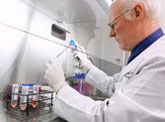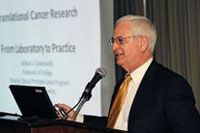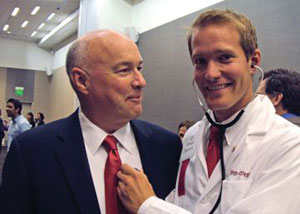The Mission of the Urological Research Foundation is to support research and patient education in prostate cancer.
prepared by Cecilia Lacks, PhD

The Genistein Project
The initial research from this project found that genistein, a component in soy, targets and prevents vital steps that must occur for a cell to spread.
Now, the research is out of the lab and into clinical trials on patients.
The first trials showed that genistein is well tolerated with few and minor side effects and that genistein may represent a potential preventative agent against metastatic prostate cancer.

Now, these trials are looking at the effects of genistein on highly aggressive prostate cancer.
The trial enrolls patients who are at a high risk of recurrence because they have adverse clinical tumor features and compares those treated with radical prostatectomy plus genistein (a soybased drug) to those treated with radical prostatectomy plus placebo.
Preliminary evidence suggests that genistein may work to decrease tumor cell spread and thereby reduce the likelihood of developing metastatic disease.
Dr. Catalona is co-investigator on this project, in conjunction with Dr. Raymond Bergan at Northwestern. It is in its clinical “Phase-2 Trial of Genistein in Men with Circulating Prostate Cancer Cells.”
(See Fall 2011 QUEST, page 10 on www.drcatalona.com for complete story.)
Connection Between Genetic Risk Tests and Prostate Biopsies

One dilemma in early diagnosis of prostate cancer is the decision when to recommend biopsy.
At the present, biopsy is the only sure way to diagnose prostate cancer and the only way to approximate cancer aggressiveness with a Gleason score from the biopsy specimens.
Some biopsies turn out to show no cancer but doctors don’t know or can’t predict ahead of time which those will be. If they could predict unnecessary biopsies, it would be a relief to patients and doctors – and a cost savings to the health care system.
Dr. Catalona’s research team is conducting a clinical study with deCODE genetics, Inc. to see if their prostate cancer genetic risk test has a correlation with prostate biopsy results.
The genetic research has discovered variations that seem to be either associated with prostate cancer or PSA secretion. Comparing these variations to biopsy results of past patients could help determine if the genetic variations associated with prostate cancer could be used to supplement PSA testing.
If connections are found or confirmed, the tests could better predict which patients with elevated PSA levels should have a biopsy. So far, nearly 1000 of Dr. Catalona’s patients have signed consent forms to be part of this study.
The Genetics Working Group (GWG)

One of the most important goals in prostate cancer research today is to answer the question: Which genetic variations associated with prostate cancer are also associated with tumor aggressiveness?
To substantially expand research in this area, Dr. Catalona organized and led the first National Cancer Institute Prostate Cancer Genetics Workshop at the end of 2010.
The workshop assembled 69 leading prostate cancer genetic researchers from around the world to develop plans for a large, new consortium and patient reference base.
Dr. Catalona pointed out that “although many research groups are studying various aspects of prostate cancer genetics, they do their work with limited genetic samples and usually with a relatively small group of researchers.
“We are going to share our samples, and acquire samples from many leading medical centers, thus allowing for thousands to be examined, and we are bringing together some of the best researchers in the world to plan and conduct the studies.”
(See Winter 2010 QUEST, page 2 on www.drcatalona.com for complete story: Going After the Big Question: Which Cancers are Aggressive and Which Aren’t.)
The ultimate plans for the GWG are to conduct a large case-case-control study of aggressive prostate cancer and identify a genetic fingerprint for susceptibility to life-threatening prostate cancer.
These genetic signals will be followed up with studies to provide fundamental insights into the development and progression of prostate cancer and should provide clinically useful biomarkers to identify susceptibility and point to strategies for prevention and new treatments for aggressive prostate cancer.
“I am a relatively new patient and when I went in for a follow-up visit after my surgery, I brought Dr. Catalona a picture of my medical student son. When I’m with my son, I think about his future and realize how important Dr. Catalona’s prostate cancer genetic studies are and what an impact they could have on future generations.”
Joe Matesic
Genetic Factors That Affect Baseline PSA
PSA testing is complicated. Some men with higher PSAs are found, after biopsy, not to have cancer. And some men, with lower PSAs are found, after biopsy, to have cancer.
More refined tests – freePSA, PSA Velocity, ProPSA – have helped to interpret PSA scores and recommendations for biopsy.
Researchers are continually looking for more and better information to interpret PSA results.
Dr. Catalona collaborated with deCODE genetics on an international genome-wide association study of genetic factors that affect baseline PSA levels in men.
They found that three of the genetic variants associated with high baseline PSA levels are also associated with a higher likelihood of not finding cancer in prostate biopsies. In contrast, four other genetic variants were associated with higher likelihood of finding prostate cancer in biopsies.
The findings, published in Science Translational Medicine, suggest that a personalized PSA value may be appropriate in deciding when to perform a prostate biopsy.
ProPSA
Dr. Catalona is looking for various ways to make PSA testing a better indicator for finding aggressive prostate cancer in its earliest stage.
ProPSA appears to be an advance in this area. When combined with other PSA information in a so-called “prostate health index (phi),” it is a better marker than free or complexed PSA for distinguishing between PSA elevations due to prostate cancer and those due to benign conditions of the prostate.
The issue is not just about saving lives, but about preventing unnecessary and uncomfortable prostate biopsies.
Dr. Catalona was lead investigator on a multi-institutional clinical trial of [-2] pro-PSA as a biomarker to aid in the early detection of clinically relevant prostate cancer.
This trial serves as the pivotal study for requesting FDA approval of this marker.
This new biomarker is currently under FDA review; it is already approved in the European Union and Australia.
Dr. Catalona is currently collaborating with Beckman Coulter and deCODE genetics to combine the [-2]proPSA test with 25 genetic markers to determine how much added value there would be in combining them.
Looking for New Early Detection Tests

While PSA is the best test now available for early detection of prostate cancer, the search for new and more refined diagnostic tests is an important area in prostate cancer research.
Dr. Catalona and Ohmx, a bioelectronic detection company, jointly invented a urine-based test for detecting prostate cancer.
To date, urine samples from 68 of Dr. Catalona’s patients have been collected for testing, and the preliminary results are promising. Ohmx and Northwestern have filed for provisional patents.
A Phase II follow-up will take place in conjunction with Dr. Catalona’s research team.
Nanotechnology
Using Dr. Catalona’s surgical patients, the Urological Research Foundation supported a study to research what PSA level – using nanotechnology – will inform physicians and patients if residual prostate cancer is present or not after a radical prostatectomy and what treatments, if any, might be recommended accordingly.
Nanotechnology-enabled PSA tests have been shown in preliminary studies to measure PSA in concentrations below those considered “undetectable” by conventional tests (400 times more sensitive).
This sensitivity offers the possibility of being of clinical benefit in the post-prostatectomy setting, as it may forecast PSA recurrences early so that patients might seek adjuvant radiation treatment earlier and thereby optimize its effectiveness.
Northwestern researchers Shad Thaxton, PhD, MD and Chad Mirkin, PhD developed the nanotechnology PSA test.
(See Spring 2011 QUEST, page 11 on www.drcatalona.com for complete story: Nanotechnology: Determining a PSA Level That Will Define “No Evidence of Disease.”)
Collecting Samples And Sharing Information
Collecting blood samples for DNA, serum, tissue and urine samples provides valuable resources for discovering the causes of prostate cancer, as well as determining the aggressiveness of prostate cancer.
Storing them in a biorepository and then sharing them with other researchers allows for more reliable and useful study results.
Dr. Catalona”s research team collects genotype (genetic variants), phenotype (clinical information about the cancer), and follow-up data on all of his patients and downloads the data into the SPORE (Specialized Program of Research Excellence) database on a monthly basis.
They collect blood for DNA, serum, tissue, and urine samples on all patients who consent to participate and they provide them to Northwestern’s SPORE biorepository.
Science Translational Medicine







